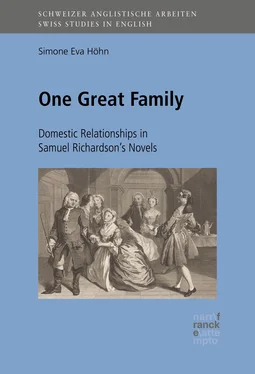DelanyDelany, Patrick, correspondent of Richardson’s fifteen sermons are structured more clearly according to content and in a way which highlights the principle of reciprocity. Their focus is the “social duties” – AllestreeAllestree, Richard’s “duty to one’s neighbour”. However, these are clearly to be understood as part of the wider framework of duties detailed in The Whole Duty . Delany makes the explicit link at the outset of sermon VIII: “All the precepts of religion respect either our duty to GOD, to our Neighbour, or to Ourselves: […] the duties we owe to ourselves, are but secondary and subservient to those [other duties]” (139).2 Each sermon takes a particular scriptural quotation for its starting point, and, in most cases, a particular social relationship is allotted exactly one sermon. The first sermon serves as a kind of introduction, insisting, similarly to Allestree, that “ Universal Righteousness [is] absolutely necessary to social Honesty ” (1). Sermons II and III3 concern the duties of marriage partners, while sermons IV–VII address the duties of parents to children. Interestingly, and in contrast to Allestree, Delany starts with the chronologically earlier duty. Allestree emphasizes the duty due to parents; by placing children’s duties first, he structurally confirms the point which he also makes explicitly, namely that children have no excuse to rebel against a tyrant parent. The rights of parents take precedence over – come before – the welfare of children. If Delany, on the other hand, starts with the parents’ duty, he implicitly stresses parents’ responsibility to their offspring and attributes blame to them if their children should be undutiful.4 And when, again like Allestree (298), he includes gratitude as a reason for obedience, he tacitly acknowledges that filial gratitude requires parental kindness. This is not, however, to say that Delany does not take children’s duty (sermons VIII–IX) seriously. In one point, he goes even further than AllestreeAllestree, Richard, stating that “I have often admired it, as a glorious instance of discipline in the Jewish commonwealth, that an undutiful child was to be stoned to death by the people” (149). The term ‘admiration’ is clearly not meant in the sense of ‘wonder’ – in the next passage, Delany continues to call this law “the wisest institution that ever obtained in any nation” (150).5
Sermon X is concerned with servants’ duties to masters, its counterpart, XI, with masters’ duties to servants. Sermons XII–XIII are concerned with more general relationships among men, particularly the duty of paying debts. Based on the same quotation, DelanyDelany, Patrick, correspondent of Richardson goes on, in sermon XIII, to discourse on the duty of love. Sermon XIV concerns the duties of a ruler toward his subjects, a topic which AllestreeAllestree, Richard had refused to discuss – a difference which may be explained in the different political situation. Allestree, a royalist writing shortly before the Restoration, had reason enough to complain that most people were “already much better read” in the “duty of their Supreme” than in their own (291; Sunday XIV). Delany’s final sermon, XV, concerns the “ [m]utual Duty of Princes and People”. Remarkably, this sermon, “ Preached on the Anniversary of the Martyrdom of KING CHARLES I” (299), unites in its title reverence for a king who believed in the absolute authority of kings with an emphasis on reciprocity.6 Despite the explicit admiration of Charles as possessing “more personal virtues, than perhaps any one Prince recorded in history” (305), an equal emphasis is awarded to the (English) ruler’s function as “the guardian of the liberty and rights, religious, and civil, of his people. This is his true character, and the only foundation of his power” (304). Without going so far as to explicitly condone rebellion, Delany here leaves some ground for the supposition that the breach of duty in one party may justify rebellion in the other. The contrast to his attitude to the parent-child relationship is striking: the concept of absolute obedience appears more resilient in private than in public life (cf. KayKay, Carol 169).
Despite their differences, both AllestreeAllestree, Richard and DelanyDelany, Patrick, correspondent of Richardson ground their system of moral duty in a combination of reciprocity7 and patriarchy – the system which Richardson draws on for the moral dilemmas played out in his novels. Hierarchical structures overlay more egalitarian ones of brotherhood (or, in Richardson’s novels, bonding among women), and the authority at the top is envisaged as male and based on fatherhood.8 Reciprocity is equally crucial. Insistence that the breach of duty in one party does not cancel the other’s duty goes hand in hand with the presumption that undutifulness commonly amounts to ingratitude. What is missing in the moral tracts, however, is a detailed response to conflicts of duty, although Allestree and Delany present the individual as enmeshed in a network of obligations. In the case of the former, this network appears particularly complex: alms-giving, for example, is owed on two different grounds: “He that is in poverty and need, must be relieved by him that is in plenty; and he is bound to it, not only in charity, but even in justice” (283; Sunday XIII)9. Similarly, good counsel is due to a spouse, to friends and even enemies (significantly, it is not mentioned as a filial duty10), and, finally, every duty to one’s “neighbour”, and even to one’s self, is tied up with duty to God. With regard to servants, for example, AllestreeAllestree, Richard writes: “God has commanded Servants thus to obey their Masters; and therefore the obedience they pay is to God” (335; Sunday XV). Yet although he acknowledges the possibility that a person in authority may issue “unlawful commands”, and although he insists that these must not be obeyed, he provides little to no framework for dealing with conflicts of duty.
It is, perhaps, more a symptom than a cause of this that the word ‘reciprocity’ so frequently mentioned in Richardson’s novels is used in a two-fold sense. “It is my notion, that one person’s remissness in duty, where there is a reciprocal one, does not absolve the other party from the performance of his”, Harriet Byron writes, commenting on Sir Thomas’s domestic tyranny (1:315). She makes a similar point when discussing Lady L.’s secret correspondence with her later husband: “Ought you not to have done your duty, whether your father did his , or not?” (1:333). The severity of the remark is somewhat mitigated by the fact that it is not addressed to Lady L. directly, but occurs as an apostrophe in a letter to Lucy Selby. In contrast, Lovelace makes a very different use of the term. Thus, when he writes to Belford concerning his uncle Lord M.’s public criticism of him, he comments: “He is very undutiful, as thou knowest. Surely, I may say so; since all duties are reciprocal” (415). Clearly, what differentiates the usage of ‘reciprocity’ by the heroine of Grandison and the villain of Clarissa , respectively, is more than their good or bad intentions. Rather, their concepts of reciprocity are different. For Harriet, reciprocal duty means a stable relationship between two parties who are each obliged to do some specified good to the other. For Lovelace, reciprocity means an exchange of goods as in a contract. Thus, if his uncle “rave[s]” at him, he may be called undutiful in return (415). Whether he talks of duties or of voluntary benefits, exchange is at the heart of Lovelace’s concept of reciprocity, and he takes care to be the one who has more to give. Significantly, he is too proud to accept financial help – and, in consequence, “control” – from his relations (50).
Читать дальше












